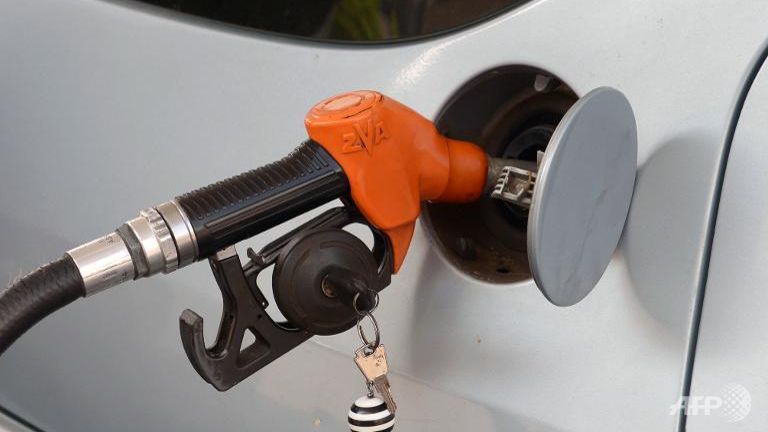Oil price falls as Iran nuclear framework reached
 A motorist filling up petrol at a pump kiosk. (AFP/Fadel Senna) |
NEW YORK: Crude oil prices fell on Thursday (Apr 2) after six world powers and Iran announced they had agreed on a framework to curb Iran's nuclear drive.
With the tentative deal, if confirmed, likely to allow Iran crude exports back on the markets, Brent North Sea crude for delivery in May, the global benchmark contract, slumped US$2.15, settling at US$54.95 a barrel in London trade. The US benchmark, West Texas Intermediate (WTI) for May delivery, shed 95 cents to close at US$49.14 a barrel on the New York Mercantile Exchange.
Traders have been following the marathon negotiations closely. Shortly before the New York market closed, the world powers and Iran said that Tehran has agreed to curtail its nuclear programme in return for the lifting of US and European Union nuclear-related sanctions that have harmed its economy.
Lifting sanctions could open up the flow of Iranian crude to an oversupplied global market. The glut has pushed crude prices more than 50 per cent lower since last June.
The outline of the deal marked a major breakthrough in a 12-year standoff between Iran and the West, which has long feared Tehran wants to build a nuclear bomb. Iran has insisted the nuclear programme is for peaceful purposes.
At the beginning of the press conference in Lausanne, Switzerland, the price of WTI, which had been trading lower since the market opened, fell to US$48.11 a barrel before paring its losses.
The countries announced the drafting of a full agreement would begin immediately, with a Jun 30 deadline for completion. The sanctions would be lifted after the UN atomic agency verifies Iran has fulfilled the terms of the deal.
The so-called P5+1 group - the United States, Britain, China, France and Russia plus Germany - hope that the deal will make it virtually impossible for Iran to make nuclear weapons under the guise of its civilian programme.
Commerzbank analysts, citing shipping sources, said earlier this week that Iran has at least 30 million barrels of crude oil in storage onboard tankers that could quickly move onto the market if sanctions were lifted.
Iran has the world's fourth-largest oil reserves. The OPEC member's crude exports have fallen from more than 2.2 million barrels per day in 2011 to about 1.3 million bpd because of the US-EU sanctions.
Traders also kept an eye on the latest Baker Hughes count of US crude oil drilling rigs, looking for clues that the strong US crude output could be easing. The count fell by 11 rigs from last week, and the number of operating rigs has fallen more than 50 per cent since October.
What the stars mean:
★ Poor ★ ★ Promising ★★★ Good ★★★★ Very good ★★★★★ Exceptional
Latest News
More News
- Russian President congratulates Vietnamese Party leader during phone talks (January 25, 2026 | 09:58)
- Worldwide congratulations underscore confidence in Vietnam’s 14th Party Congress (January 23, 2026 | 09:02)
- Political parties, organisations, int’l friends send congratulations to 14th National Party Congress (January 22, 2026 | 09:33)
- 14th National Party Congress: Japanese media highlight Vietnam’s growth targets (January 21, 2026 | 09:46)
- 14th National Party Congress: Driving force for Vietnam to continue renewal, innovation, breakthroughs (January 21, 2026 | 09:42)
- Vietnam remains spiritual support for progressive forces: Colombian party leader (January 21, 2026 | 08:00)
- Int'l media provides large coverage of 14th National Party Congress's first working day (January 20, 2026 | 09:09)
- Vietnamese firms win top honours at ASEAN Digital Awards (January 16, 2026 | 16:45)
- ASEAN Digital Ministers' Meeting opens in Hanoi (January 15, 2026 | 15:33)
- ASEAN economies move up the global chip value chain (December 09, 2025 | 13:32)
















 Mobile Version
Mobile Version